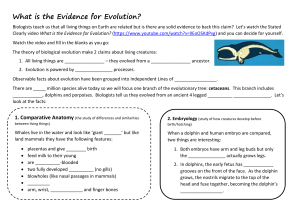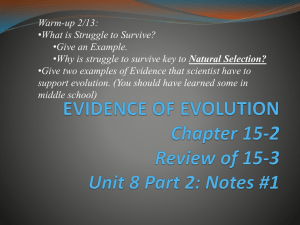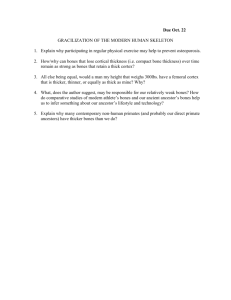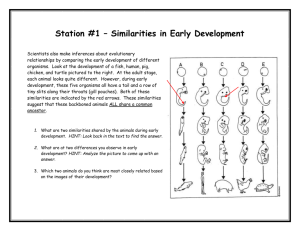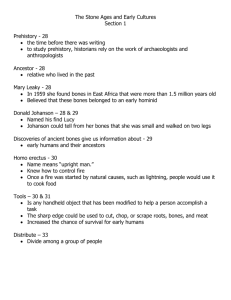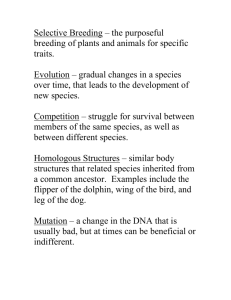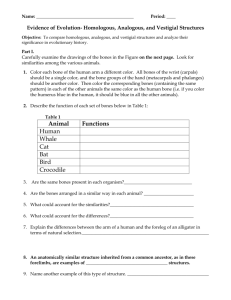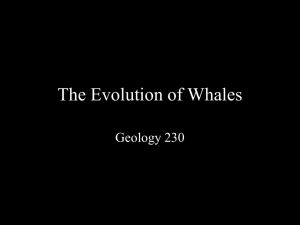Evidence Of Evolution
advertisement
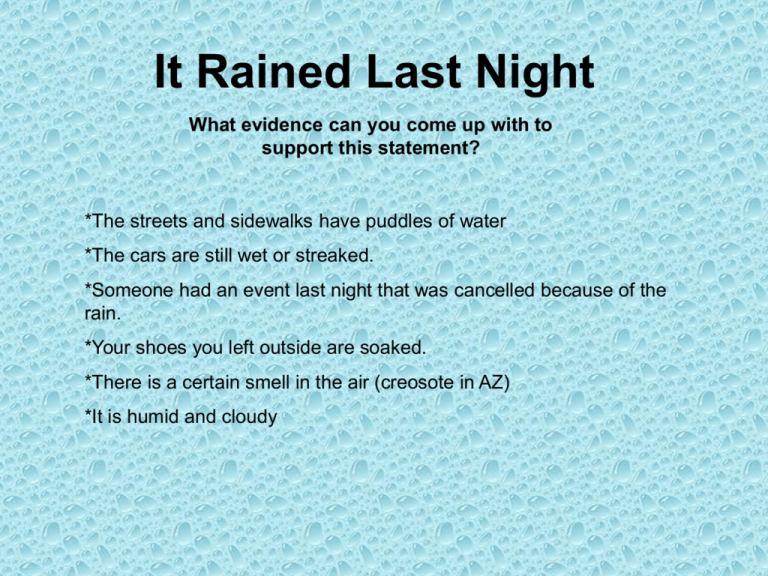
It Rained Last Night What evidence can you come up with to support this statement? *The streets and sidewalks have puddles of water *The cars are still wet or streaked. *Someone had an event last night that was cancelled because of the rain. *Your shoes you left outside are soaked. *There is a certain smell in the air (creosote in AZ) *It is humid and cloudy It’s a theory….. An accepted scientific theory is a statement based on observation and experiment. It is repeatedly tested and confirmed through experiment and observation. It is a widely accepted statement based on scientific evidence that helps explain a group of facts. Theory of Evolution Germ Theory The Theory of Gravity The Theory of Evolution makes two bold claims -All living things on Earth are related. Have evolved from a common ancestor. -The evolution of living things is powered by natural process that can be observed and understood. Extraordinary claims require evidence What is the evidence for evolution? Independent Lines of Evidence *Comparative Anatomy *Embryology and Development *Fossil Records *DNA Comparison Cetaceans (or whales) evolved from a four legged, land walking ancestor. Comparative Anatomy Whales are mammals… *Have placenta and give live births *Feed milk to their young *Are warm blooded *Do not have gills but breathe with lungs *Have hair *Have blow holes, but are nasal passages when looking at the skull. Evolved from four legged, land walking mammals…. Comparative anatomy Homologous Structure: Whales have arm, wrist, hand and finger bones…similar to cats, bats, hippos and people. is an organ or bone that appears in different animals, showing commonalities demonstrating descent from a common ancestor. *In other words, it's when very different animals have bones that appear very similar in form or function and seem to be related. Same structure, but different function. Homologous Structures (Same) Back legs!? Not actually functional legs, but there are bones there that don’t serve a purpose. *Hip bone (Ball and socket joint) Thigh and shin bone. WHY? Vestigial Organs: Physical structures that were fully developed and functional in an ancestral group but are reduced and unused in the later species. These bones do not serve a function or purpose but they do provide some evidence of the claim. Embryology and Development Compare Embryos of different species at different stages of development. Spotted Dolphin 5 weeks These two lines of evidence tell the same story. lets look at another line of evidence to confirm that ancestors of whales where four legged land walkers. What does the fossil record show? We should be able to see stages of development. Or intermediate fossils. Basilosaurus 30-40 MYA Fully formed back legs (hip, thigh, ankle, toes) Was small and not very strong. Likely was not very useful. Maiacetus 50 MYA *Legs sturdy enough to walk on. *Found among marine fossils *Same teeth and ear bone structure as basilosaurus and modern whale. Artist depiction Modern Dolphin: Nasal passage on top. Basilosaurus: Nasal passage in the middle. Maiacetus: Nasal passage at the end DNA Comparison -Compare DNA code of different organisms to find out who is most closely related to who. -When Whale DNA is compared to other animals we find that the closest genetic match is to the hippopotamus. *Does NOT mean that they evolved from hippos, but that they both evolved from some common ancestor Hippos and Whales: -Maiacetus have specially shaped ankle bones found only in hippos. -Hippos give birth and nurse underwater -Both have multi chambered stomachs -Both missing coat of fur Homologous Structure: Very different animals have bones that appear to be the same in form and function. Are the same in structure, but may not perform the same function. Analogous Structure: Body part in different species that is similar in function but not in structure that evolved in response to a similar environmental challenge. Same structure, but does not function the same (walking, swimming) Different structure, but same function (Flying)
